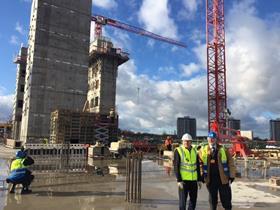Collapse has shown public sector clients need to share more of risk, Bruno Dupety adds

The chief executive of Vinci has said Carillion being listed on the Stock Exchange helped send it under because City demands forced it into chasing unrealistic growth.
Vinci is listed on the Paris stock exchange and published its first half results at the end of last week with revenue in the six months to June growing 7% to €19.8bn (£17.6bn) with earnings up close to 5% to €2.9bn (£2.6bn).
But Bruno Dupety, the boss of Vinci’s £1bn turnover UK construction business, said listed contractors in the UK are being hampered by investors demanding firms spell out growth plans for the coming years.
“There is something wrong with the British system,” the Frenchman said. “[Listed firms] are encouraged by the City to grow. Growth is not virtuous. The right approach is to manage the job you are taking, not to satisfy the City. But [listed firms] have to tell a story which will please investors.”
He added he was “surprised” by Carillion’s implosion and said: “What they were disclosing at the beginning of 2017 was quite nice. [But] I think they took jobs at prices which were just impossible.”
And he said Carillion was too willing to take on risk from public sector contracts – with the firm’s collapse shining a light on those public sector clients who don’t share enough risk with their builders.
In 2016, Carillion had revenue of £1.72bn from the UK public sector – around 45% of its UK income – which involved working on more than 400 contracts.
Dupety (pictured) said: “I think Carillion has accepted conditions which are too difficult to manage. The public sector should be more flexible and fairer in managing their contracts. It’s not the case. [A lot] push all the risk on to the main contractor.”
And he said public sector bodies needed to trust their own judgment more, rather than rely on a team of advisors.
“In this country, they rely on external bodies. Why do they do that? In this country, they’re more confident in what an adviser tells them than their own judgment. For them, it’s protection.”
Dupety arrived in the UK at the end of 2014 after Vinci racked up huge losses on its scheme to extend the Nottingham tram network under a PFI deal.
Vinci completed construction work three years ago but Dupety confirmed the scheme is still not off the contractor’s books.
He declined to go into details but said the decision to sign the deal in the first place was “foolish”. He said the firm took too much risk on a job – which has seen it rack up in excess of £200m in losses – in particular the dangers of working with utilities such as water, gas and electricity.
“Taking the risk of utilities is just foolish. You don’t know where they are. You’re taking a risk on something you have no control [over].”
Vinci and the Midland Met

Dupety said the firm has not been asked to look at taking over Carillion’s scheme to build the Midland Metropolitan Hospital in the West Midlands.
Asked if he would, he told Building: “My first reaction, I would have said no way. If we were approached I would go there and visit the site, go and touch it. Then we would decide what to do. I would be interested because it’s what we do, it’s our business. If they [the client] tried to transfer the historical liabilities, I would walk away. It’s a deal-breaker.”
A National Audit Office report published last month said Carillion lost £48m on the scheme (pictured) last year.
But he added: “Maybe Carillion failed not because of terms and conditions but because of the price [they agreed].”
In April, the chief executive of the Sandwell & West Birmingham Hospitals NHS Trust, Toby Lewis, estimated the hospital would be completed in 2022, two years late, and said it would now cost between £100m and £125m more than had originally been anticipated.


























No comments yet